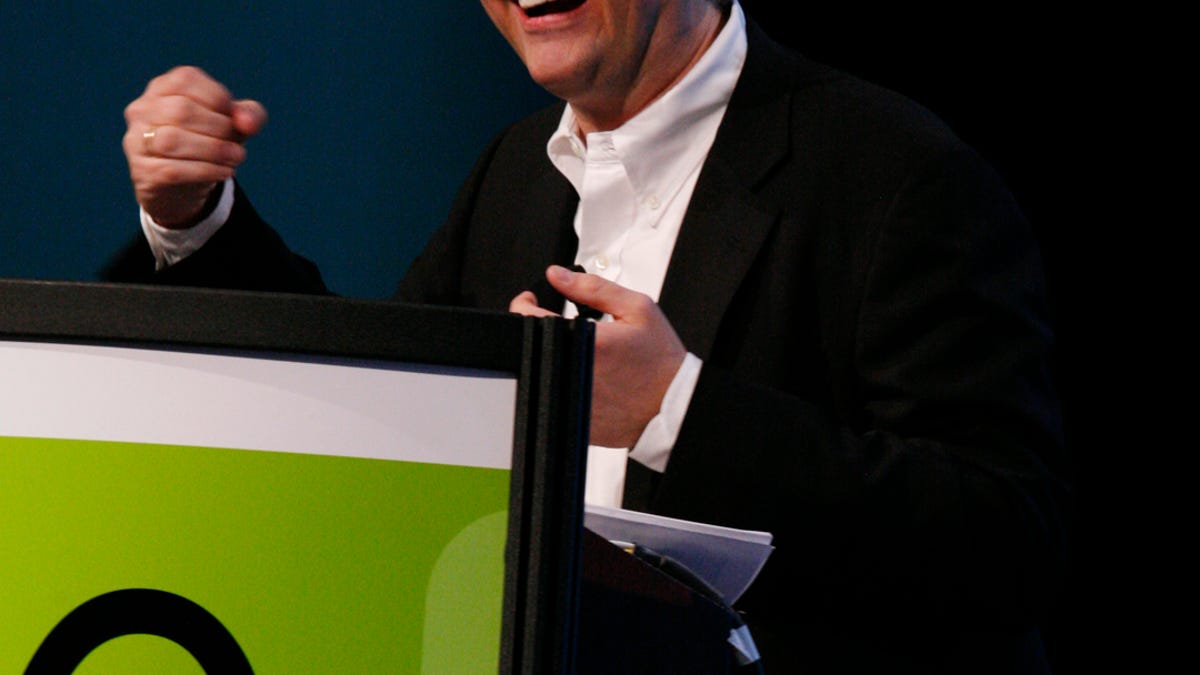Fake Steve Jobs lights up Web 2.0 Expo
The satirist blogger explains his rationale and drops a whole lot of his unique view of the world of technology.

SAN FRANCISCO--If there's one person in the world of Web 2.0 technology--or tech in general--who hasn't yet been skewered by the infamous blogger Fake Steve Jobs, get ready: He's coming for you.
In a frenetic keynote address Friday morning at the Web 2.0 Expo here, Fake Steve--otherwise known as Forbes writer Dan Lyons--gave his unique take on the world of technology, the people who drive it, and the future of media.
Fake Steve began his talk with a discussion about the issues related to surviving backlash from audience members at conferences. I was rather pleased to see that as his prop, he used an article I'd written earlier this month on the subject.
Of course, as is his style, he lampooned the concepts in the story. He pointed out that in some ways, the article had focused on Web 2.0 Expo and so he said that based on the story, he had been fearing getting in front of 5,000 angry audience members ready to jump him if they didn't like what he had to say.
"I just want to apologize in advance for the next 25 minutes, for the 25 minutes you're never going to get back," Fake Steve/Lyons said. "Please don't Twitter attack me."
He also teased Social Media Club club founder Chris Heuer for comments he made to me for that story.
"Time is our most valuable asset, and if it's being wasted, we're not going to take it," Heuer had told me. "We want our time to be well-invested."
To Fake Steve, that comment was well worth a bit of his wit.
"If you're the founder of something called the Social Media club, you've got a lot of balls talking to me about wasting my time," said Fake Steve, adding that as he understood it, the club was for people to talk about what's being talked about on Facebook.
"It's like Webkinz for adults," Fake Steve said of Facebook. "It's the biggest waste of time ever invented."
He proceeded to explain how, over the course of the time that he's been writing his Fake Steve Jobs blog, he has pretty much killed his reputation with some of his antics. The point? That it doesn't really matter what people think of him or what he says.
"I have no reputation," he said.
Some examples of those antics: His portrayal of Apple co-founder Steve Wozniak as a baboon, Oracle CEO Larry Ellison as a pimp, Sun Microsystems CEO Jonathan Schwartz as a My Little Pony doll--"I did that before I knew he was (speaking at Web 2.0 directly) before me"--Microsoft CEO Steve Ballmer as Uncle Fester and, perhaps best of all, his take on Microsoft's shipping of Vista, which he had portrayed on the blog with a picture of an elephant defecating and the headline, "Vista drops tomorrow."
"So," he continued, "Oh God, I hope no one impugns my reputation. I'll never get that job at BusinessWeek."
He then continued with a history of how he came to start his blog. He explained that as he saw traditional media organizations getting their lunch eaten by bloggers, he wanted somehow to join the new generation of media players.
So he said that he asked Forbes.com, the Web venue of his employer, Forbes magazine, if he could start a blog. They said no, he reported.
Instead, he began his own blog, and began--with impersonating Steve Jobs as if he was really saying what he felt instead of being little more than a PR voice like many corporate bloggers--being Fake Steve Jobs.
Right away, he said, he attracted a large audience--90,000 unique monthly viewers after six months--and a worldwide manhunt to figure out who he was.
The best part of that, he said, was when Forbes' editor put out a bounty to uncover his identity.
Even better, Fake Steve said, was when he wrote to the editor offering to write the blog for Forbes.com.
"He wrote back, 'Oh, Fake Steve, you're a genius, we'd love to hire you,'" he said.
So, rather than carry on the subterfuge, he told Forbes that he was, in fact, Fake Steve Jobs, and thus began his official relationship as Fake Steve with his own employer.
Ultimately, though, he said that the best part of the experience of writing the blog has been that it has created what he called a "platform" for others to come and "perform" via the comments section.
He said there is one commenter, known as Fake Vladimir Putin, who appears nowhere else but in the Fake Steve Jobs blog comments section.
And that, he seemed to say, is really the essence of Web 2.0.
At least, it seemed to be. With Fake Steve Jobs, the snark level always makes it a little difficult to tell what the real message is.

